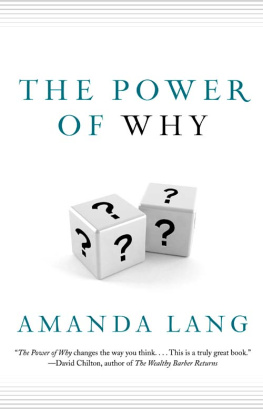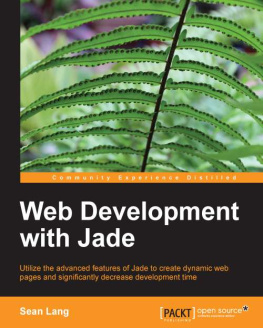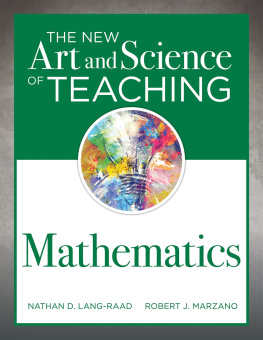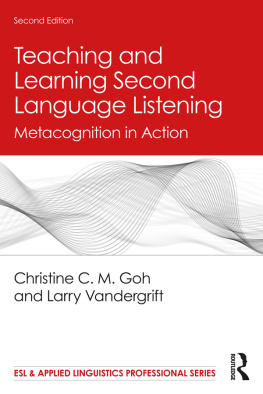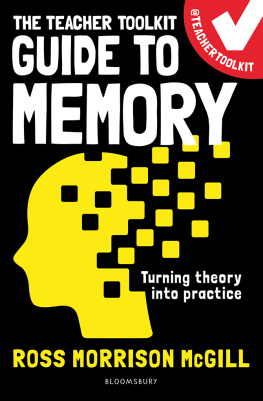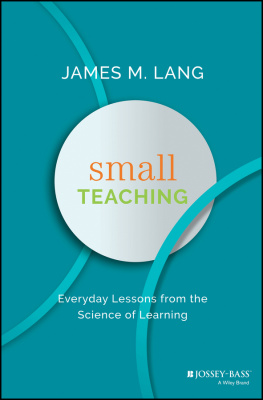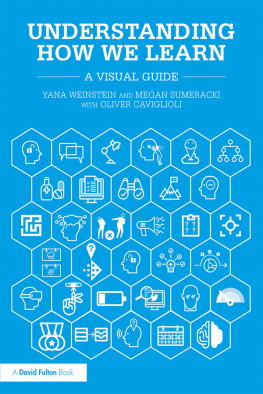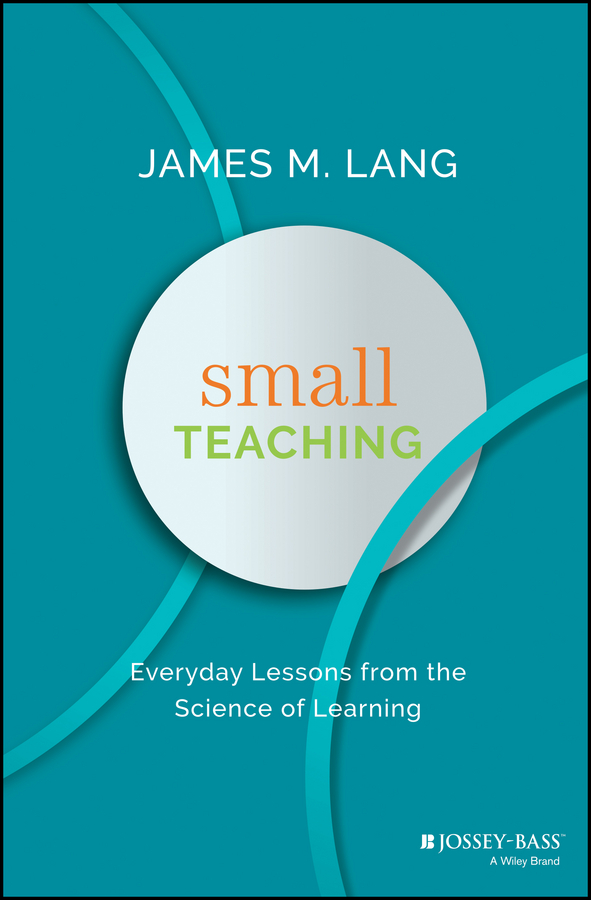
Table of Contents
Guide
Pages
Small Teaching
Everyday Lessons From the Science of Learning
James M. Lang
Copyright 2016 by John Wiley & Sons, Inc. All rights reserved.
Published by Jossey-Bass
A Wiley Brand
One Montgomery Street, Suite 1000, San Francisco, CA 94104-4594www.josseybass.com
No part of this publication may be reproduced, stored in a retrieval system, or transmitted in any form or by any means, electronic, mechanical, photocopying, recording, scanning, or otherwise, except as permitted under Section 107 or 108 of the 1976 United States Copyright Act, without either the prior written permission of the publisher, or authorization through payment of the appropriate per-copy fee to the Copyright Clearance Center, Inc., 222 Rosewood Drive, Danvers, MA 01923, 978-750-8400, fax 978-646-8600, or on the Web at www.copyright.com. Requests to the publisher for permission should be addressed to the Permissions Department, John Wiley & Sons, Inc., 111 River Street, Hoboken, NJ 07030, 201-748-6011, fax 201-748-6008, or online at www.wiley.com/go/permissions.
Limit of Liability/Disclaimer of Warranty: While the publisher and author have used their best efforts in preparing this book, they make no representations or warranties with respect to the accuracy or completeness of the contents of this book and specifically disclaim any implied warranties of merchantability or fitness for a particular purpose. No warranty may be created or extended by sales representatives or written sales materials. The advice and strategies contained herein may not be suitable for your situation. You should consult with a professional where appropriate. Neither the publisher nor author shall be liable for any loss of profit or any other commercial damages, including but not limited to special, incidental, consequential, or other damages. Readers should be aware that Internet Web sites offered as citations and/or sources for further information may have changed or disappeared between the time this was written and when it is read.
Jossey-Bass books and products are available through most bookstores. To contact Jossey-Bass directly call our Customer Care Department within the U.S. at 800-956-7739, outside the U.S. at 317-572-3986, or fax 317-572-4002.
Wiley publishes in a variety of print and electronic formats and by print-on-demand. Some material included with standard print versions of this book may not be included in e-books or in print-on-demand. If this book refers to media such as a CD or DVD that is not included in the version you purchased, you may download this material at http://booksupport.wiley.com. For more information about Wiley products, visit www.wiley.com.
Library of Congress Cataloging-in-Publication Data
ISBN 978-1-118-94449-3 (Hardcover)
ISBN 978-1-118-94451-6 (ePDF)
ISBN 978-1-118-94450-9 (ePub)
Cover design by: Wiley
For Katie, Madeleine, Jillian, Lucie, and Jack, who taught me much when they were small
Acknowledgments
First and foremost, I must express my gratitude for monthly writer's group meetings with Mike Land and Sarah Cavanagh, during which I received incredibly wise and helpful feedback on every chapter of this book. Mike and Sarah served perfectly as advanced and interested readers, and they made this a better book in every way possible. Special thanks to Sarah for helping me avoid glaring errors in my use of terminology and theories from her home discipline of psychology and for pointing me to numerous articles that helped thicken my research.
I had the opportunity to present the research from this bookand to test out its applicability to instructorsat many colleges and universities while I was drafting and revising the manuscript. So thanks to my hosts and workshop participants at Olds College (Canada), Misericordia University, Regis College, the University of Denver, Fisher College, Florida Institute of Technology, King's Academy (Jordan), MacEwan University (Canada), Indiana State University, the DeLange Conference at Rice University, the University of TexasSan Antonio Health Sciences College, Bucknell University, Georgia Tech, and Columbus State Community College.
The seeds for this book were first planted at a meeting with David Brightman at the Teaching Professor Conference in New Orleans, and he was an excellent guide as I worked my way through the conception and proposal stages. His commitment to higher education and to publishing excellent books made him an ideal editor. Pete Gaughan and Connor O'Brien proved equally dedicated to the project, and my thanks especially to Connor for his developmental notes on the first draft of the book. Two outside reviewers also helped improve the book in many important ways, and I am grateful to them as well.
Assumption College gave me the sabbatical that enabled me to draft the book and to meet my deadlines, and many colleagues there, both faculty and administrative, have been supportive of my work.
I wrote the vast majority of this book at Nu Caf in Worcester, Massachusetts. Thanks for all the green tea. It seemed to help.
I come from a family of teachers; it must have been something in the water where we grew up. I continue to find inspiration especially from my sister, Peggy, who has served as both teacher and principal to urban student populations in Chicago, and from my brother, Tony, at whose heels I have been tagging along as a student and teacher and writer and human being since we were childhood bunkmates.
Much of my extracurricular thinking about learning happens as a result of observing the experiences of my children, to whom this book is dedicated, so thanks to them for the enthusiasm they have always shown for learning both in and out of school.
Even more of my thinking about education happens as a result of my conversations with my wife, an elementary school teacher. During part of the time that I was writing this book I spent Friday mornings volunteering in her kindergarten classroom, and I was reminded each week of the incredible value of teaching as a profession and of the selfless commitment that so many teachers make to their students. Those reminders continually renewed my inspiration to write this book.
So a final and most heartfelt thanks to Annefor everything.
About the Author
James M. Lang is professor of English and director of the Center for Teaching Excellence at Assumption College in Worcester, MA. He is the author of four books: Cheating Lessons: Learning From Academic Dishonesty (Harvard University Press, 2013), On Course: A Week-by-Week Guide to Your First Semester of College Teaching (Harvard University Press, 2008), Life on the Tenure Track: Lessons From the First Year (Johns Hopkins University Press, 2005), and Learning Sickness: A Year with Crohn's Disease (Capital Books, 2004). He writes a monthly column on teaching and learning for the Chronicle of Higher Education; his work has been appearing in the Chronicle since 1999. His book reviews and public scholarship on higher education have appeared in a wide variety of newspapers and magazines, including the Boston Globe, Chicago Tribune, and Time. He is a member of the Fulbright Senior Specialist roster in higher education, and he has conducted workshops on teaching for instructors at more than 50 colleges or universities in the United States and abroad. He has a BA in English and philosophy from the University of Notre Dame, an MA in English from St. Louis University, and a PhD in English from Northwestern University. Visit his website at http://www.jamesmlang.com.
Next page


